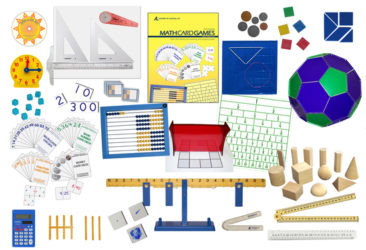“What is the Math Set for?”
This is a frequently asked question. Last year, I got to meet a lot of homeschoolers at conventions. Our sales table displays manipulatives from the Math Set. They draw kids in like magnets. Kids, who have them at home, stop to play with their favorite manipulative or card game. Some kids call them their “math toys.” Kids, who have never seen them, stop and join in the fun.
Kids play and don’t want to leave.

A delightful mother watched her kids tinker with some of the manipulatives. We made small talk.
“My kids do well in math. They don’t need all this stuff,” she politely reported.
I invited her 12-year-old to solve a math problem. She agreed.
“We need to draw 252 maps in 12 weeks. Six kids share the work. How many maps does every kid need to draw each week?” I asked.
You could see her working through the information in her head. I offered her paper and pencil. She took it, and asked for the problem again. She recorded the numbers and kept thinking. She fidgeted.
I had seen the same thing many times when I invited students her age to solve this problem.
“You think you know what to do, but you just aren’t sure where to start, right?” I gently asked.
She nodded and blushed.
I walked the girl through the problem.
“That’s what all these manipulatives are for. It helps kids do math,” I explained to the mother. “I’ve worked with lots of kids who ‘do well in math,’ but can’t answer the problem I gave your daughter. My two oldest kids could do this problem mentally at ages 11 and 10.”
That’s the RightStart difference.
The manipulatives help kids not simply get answers, but understand math – how to solve problems. Kids learn how to do math.
From grouping numbers for basic math operations to doing mental math, the manipulatives allow children to see math, so it makes sense.
At another convention, an 11-year-old struggling with multiplication found confidence as I taught her how to use the AL Abacus to do multiplication. Math facts were no longer something she had to memorize, but something she could see because she entered 7 five times. 7 × 5 = 35. She could see it on the abacus. She entered several multiplication problems until her mother joined us. She enthusiastically showed her mother the tool that finally made multiplication make sense.
Daily 50-problem worksheets are replaced with games kids enjoy. The games support the lessons with repetition. Math skills are secured and strengthen with games. They have no idea they are doing more than ample review work for previous lessons.
The Math Set provides everything you need to help your student understand, apply, and enjoy math. The curriculum guides you in how to use the manipulatives and cards, lesson by lesson, game by game.
In time, kids don’t need “all this stuff” because the manipulatives have done their work – they have given the student a sound understanding of math.
Long ago, Piaget said, “Play is the work of childhood.” RightStart Mathematics understands that and makes it easy for kids. RightStart Mathematics gives students “math toys” to play with, so they can do the work you and I call math.
That’s what “all this stuff” is for.
 Ellen Martin, mother of five, lives is Wilmore, Kentucky with her husband Andrew. With a Masters of Arts in Christian Education and a Master of Divinity from Asbury Theological Seminary, author of new release, A Life Shared: Meaningful Conversations with Our Kids. Her days are filled with her workshop “THE TALK: Embrace the Sacred Gift,” writing, and life with family and friends. She can reached through her website alifesharedwithkids.com.
Ellen Martin, mother of five, lives is Wilmore, Kentucky with her husband Andrew. With a Masters of Arts in Christian Education and a Master of Divinity from Asbury Theological Seminary, author of new release, A Life Shared: Meaningful Conversations with Our Kids. Her days are filled with her workshop “THE TALK: Embrace the Sacred Gift,” writing, and life with family and friends. She can reached through her website alifesharedwithkids.com.
